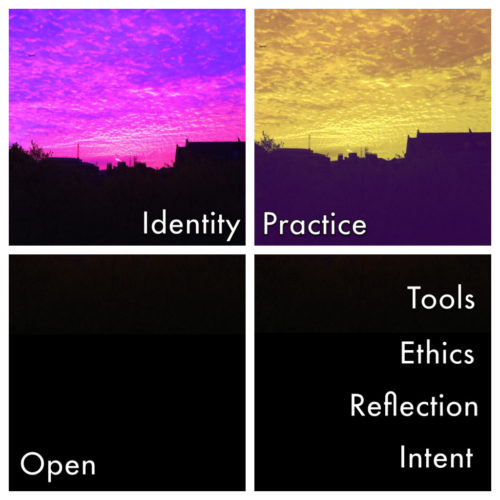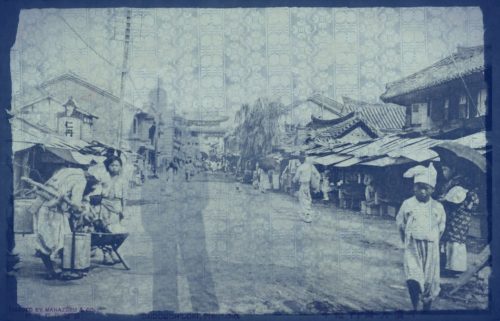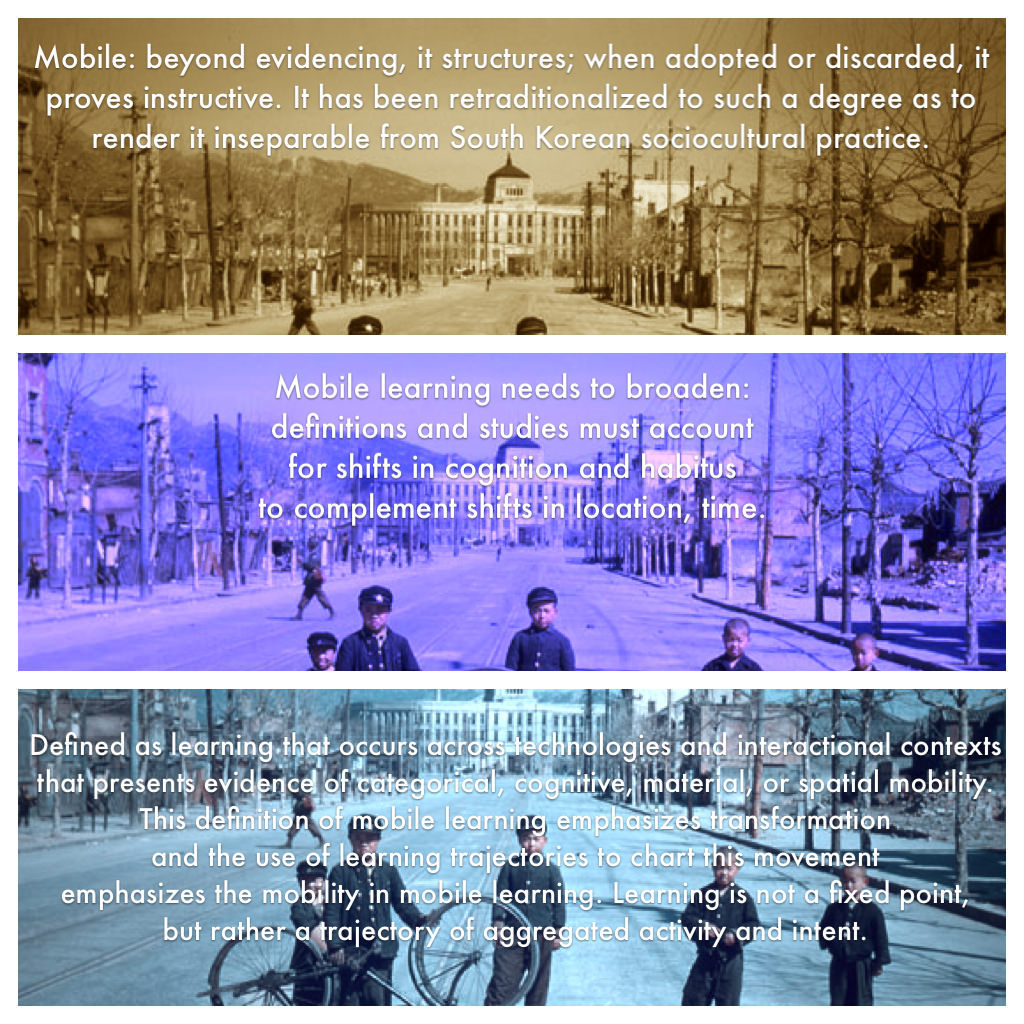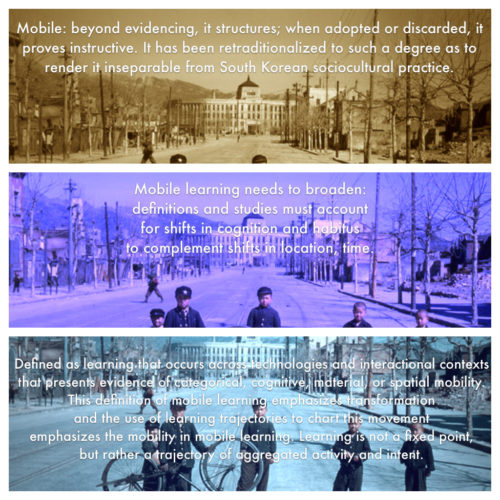
I had recently interviewed for a university lecturer position and the preparation I had done ahead of that seemed to be a worthwhile process in and of itself. I was forced to whittle down abstractions into something tangible, refine my theories, pedagogy, and positions. It also forced me to consider the balance I have always tried to maintain between following my own research interests and how disparate that might present itself to a prospective audience. I see little disconnect between my work in higher education, in ICT4D, in mobile learning, and teacher training, but I can’t assume my audience will feel the same.
So I am just presenting this as I wrote it, minus about 10 pages. I stumbled over a few answers (many, to be sure) but this is my work as it stands.
Research Plan
My research in focused on teacher education with an emphasis on professional practice (the act of becoming a teacher), field practice, ethical technology use, feedback and mentorship, community engagement, literacy, and composition in the humanities. I come from a research intensive, evidence-driven, theoretically grounded, methodologically innovative, and highly visible view of academic practice. I pride myself on innovative and robust methodological work. I have expertise in ethnography, case study models, interviews, focus groups, mixed methods, media-based methods. I have worked developing analytical models for sound, visuals, video, text, and ICT based communication, and participatory research methods.
I think teachers need to be researchers and vice versa. Developing capacity in teachers for conducting their own research is critical. Teachers must engage in the scholarship of teaching:
- engagement with the scholarly contributions of others on teaching and learning;
- reflection on one’s own teaching practice and the learning of students within the context of a particular discipline;
- communication and dissemination of aspects of practice and theoretical ideas about teaching and learning in general and teaching and learning within the discipline.
Projects
The projects I work on reflect this research position, however disparate they might seem. These don’t include the development work I do (aside from #2, which is loosely development based). All are ongoing in some phase or another and I doubt any of these will ever actually finish as such. Research never really does. The links are some of the outputs of this research.
- #1: Exploring fieldwork for humanities practice: mobile technology and its use to activate literature, history, and social sciences in urban space.
- #2: Mobile teacher training: developing professional practice in resource poor environments, or where none existed before.
- #3: Composition: Expanding writing and composition; or experimentation with how academic writing can be reconsidered in the face of media
- #4: Feedback loops: developing meaningful mentoring and feedback channels for developing professional practice in the humanities via configurations of mobile technology and face to face networks.
- #5: Digital literacy and pedagogy in the humanities: copyright, copyleft, open source, open access, and intersections of creativity, surveillance, security, privacy, and ethical practice.
- #6: Mobility, becoming, and assimilation: managing transitions through mobile technology for migrants, international students, or early career peripheral participants
- #7: Pedagogy of Simultaneity and aesthetic literacy: pedagogy for learning engagements in open, lived worlds
Knowledge Exchange
I think I always knew this, but it is becoming clear how critical the capacity for obtaining funding is or has become, so I like to highlight the fact that the work I do (across development, humanities, teacher education, mobile technology) is or can be attractive to funders.
- UK: NERC-ESRC-AHRC
- US: Gates, Mellon Foundation, Ford, Macarthur
- INGOs: World Bank, UNESCO, GIZ, USAID, DFID, GSMA
Pedagogy Overall
I draw on several pedagogical positions that cohere into a comprehensive whole. I use pedagogies that align with Macquarie’s vision here.
- Critical pedagogy to explore relationships that affect learning within the larger community and to develop natural conduits for linking teaching to community work. This has been reinforced by my own teaching and by my development work. If we are not addressing issues of access, equity, social justice, even if only implicitly, then I am in the wrong field.
- Role of indigenous knowledge and underrepresented groups
- Addressing myths, tropes, cliches, conventional wisdom and digging into their construction.
- Evidence-informed pedagogical practice: ‘realising’ the value of research for teaching. I believe in process, rigor, evidence, and analysis and recognize that this has incredible value for teachers as humanists and teachers as social scientists. “Educationalists at all levels need to be able to pose (…) answerable question(s) about education; know where and how to find evidence systematically and comprehensively…; retrieve and read such evidence competently and undertake critical appraisal and analysis of that evidence according to agreed professional and scientific standards; organise and grade the power of this evidence; and determine its relevance to their educational needs and environments.”
- However, evidence needs to be defined beyond the quantitative. Attainment and self-efficacy require collaborative methods.
- Experiential learning with field practice: reconnection teaching in the humanities to its lived world roots of investigation
Pedagogy on Teaching Practice
I look to engage teachers across the three domains of teaching. I believe that teachers need creativity, compassion, capacity, and resilience. I believe that teachers need networks behind them.
- Professional knowledge: teachers know their subjects. They know how to use ICT and know what they sacrifice and gain when they do so. Teachers know which groups are being advantaged and disadvantaged and how to address this.
- This links to critical pedagogy, at least as I see it
- This links to much of my research in ICT
- Professional Practice: Teachers are able to make learning engaging and valued. They use sophisticated communication techniques. Teachers have a repertoire of effective teaching strategies and use them to implement well-designed teaching programs and lessons. They operate effectively at all stages of the teaching and learning cycle, including planning for learning and assessment, developing learning programs, teaching, assessing. They do not define their authority strictly through control.
- This links to my belief that good teaching has some community engagement. Hence my preponderance on fieldwork with ICT.
- Professional Engagement: Teachers model effective learning. They identify their own learning needs and analyse, evaluate and expand their professional learning, both collegially and individually. They conduct research. They understand evidence. They can identify injustice.
- Reflective practice: there is a critical need for developing reflective practice, hence research project #4.
- Critical pedagogy: again, this need is related to seeing teachers as professional, critical, and creative agents.
Drawing on several theorists and researchers in this field, I am trying to build capacity for
- knowledge for practice: formal knowledge and theories
- knowledge in practice: practical knowledge and expertise embedded in the daily practices of teachers
- knowledge of practice: schools as sites of inquiry and research; theories are generative material for interrogation and interpretation
- Identifying pedagogical patterns, and sharing this ongoing work in the pedagogic ‘community of practice’ (Wenger, 1998).
Assessment
My view on assessment is that this a a balance between assessment for learning (formative assessment) and assessment of learning (summative assessment), and how one can affect the other in either positive or negative ways. I make a case for greater use of teachers’ judgements in summative assessment. This research, concerning the impact of summative assessment, particularly high-stakes testing and examinations, on students’ motivation for learning and on teachers and the curriculum, reveals detrimental effects. Suggestions for changes that would reduce the negative effects include making greater use of teachers’ summative assessment. However, this raises other issues, about the reliability and validity of teachers’ assessment. I am guided in no small part by the Manifesto for Teaching Online.
Assessment is an act of interpretation, not just measurement.
I tend to prefer:
- Assessment that goes hand in hand with feedback and reflective practice: moving from simulation or intimate scaffolding in first year to more professional application in lived world examples in final year.
- First year
- Links to theory, identity, experience with schooling and teaching
- Peripheral participation: simulations, case studies, social issues of access or equity
- Mentoring as professional practice
- Methods for teaching and questioning
- Final year
- Professional practice in educational settings
- Research and professional development
- Networking and collaborative activity
- Sophisticated engagements with theory
- Standards, assessment, and policy
- First year
Theoretical position
This was a difficult one to whittle down as I am influenced by many. My theoretical position in grounded in community based theories. I am drawn to but not enamored of Community of Practice (CoP) theory in teacher education as it provides a model for analyzing processes of becoming and peripheral participation (like student teachers). I am also drawn to aspects of apprenticeship and learning trajectories advanced within CoP. I draw inspiration theoretically from Vygotsky’s zone of proximal development, as many education types are. I further draw theoretical clarity from sociomateriality, or this idea that humans, technology, and material are not fully discrete but rather systems of activity. I believe these larger systems of activity are critical to developing comprehensive approaches to teacher education. I believe that too narrow a view negates this systematic understanding and contributes to reducing teaching to instrumentation. Teachers are agents of systemic change (or activity).



As usual, it is such a pleasure reading your clear and articulated thoughts! They might not start so clear and well articulated, I imagine, but the final version is always beautifully crafted!
I am looking at student’s agency/ lack of in their digital practice (what I see when looking at their informal system of tools, their PLEs) and you said you use sociomateriality and that teachers are agents of systemic change. Any reading suggestions?
My admiration and best of luck with the outcome of your interview
Thanks Caroline! Let me see if I can dig up a good reading list for you. How far along are you with the PhD? All my best!